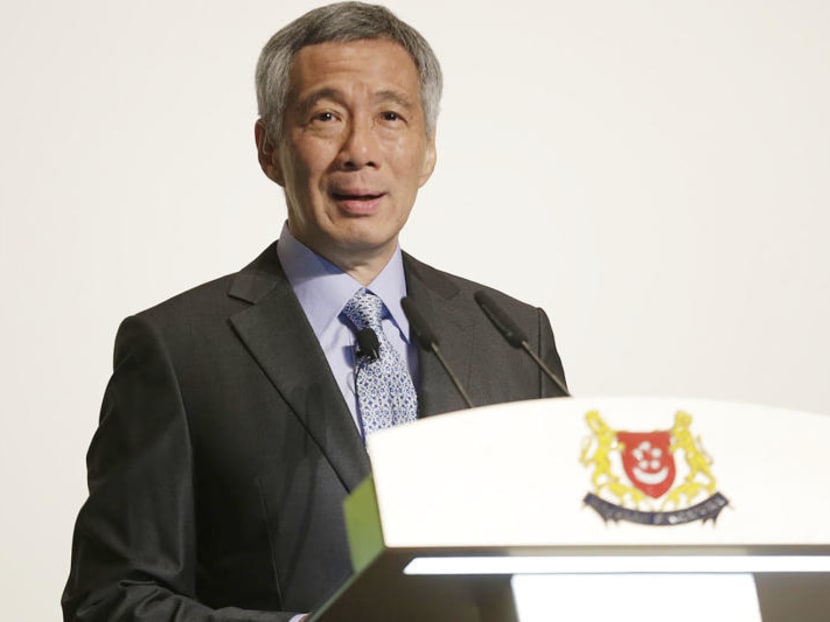PM Lee in Sydney from Thursday for bilateral and regional meetings
SYDNEY — Prime Minister Lee Hsien Loong will kick off a four-day visit to Sydney from Thursday (March 15) to attend bilateral and regional meetings at the invitation of his Australian counterpart Malcolm Turnbull.
SYDNEY — Prime Minister Lee Hsien Loong will kick off a four-day visit to Sydney from Thursday (March 15) to attend bilateral and regional meetings at the invitation of his Australian counterpart Malcolm Turnbull.
Mr Lee will take part in the Singapore-Australia Leaders’ Summit, a yearly meeting under a strategic partnership framework between the two countries. He will also join leaders from the Association of Southeast Asian Nations (Asean) for a special summit with Australia.
The meeting between Mr Lee and Mr Turnbull will be the third under the Comprehensive Strategic Partnership, a broad-ranging agreement inked by Singapore and Australia in 2015.
With initiatives spanning trade and economics, foreign affairs, defence and security, and people-to-people links, the agreement includes a landmark deal allowing the Singapore Armed Forces to carry out unilateral training in Australia for 18 weeks with 14,000 troops yearly, over 25 years. The training area is 10 times the size of Singapore.
The inaugural Leaders’ Summit was held in 2016 in the Australian capital Canberra. This was followed by a second summit in Singapore last year.
In Sydney, Mr Lee will also separately meet Greater Sydney Commission chief commissioner Lucy Turnbull and New South Wales Premier Gladys Berejiklian, the Prime Minister’s Office (PMO) said in a statement. Mr Lee will also mingle with overseas Singaporeans at a reception.
With Singapore at the helm of Asean this year, Mr Lee will co-chair the Asean-Australia Special Summit with Mr Turnbull.
It is the first time Australia — which became Asean’s first dialogue partner in 1974 — is hosting leaders from the regional grouping. In 2014, the island continent had its status upgraded to a strategic partner and agreed to hold leaders’ summits every two years from 2016. That year, the first biennial Asean-Australia Summit was held in Laos.
This year’s summit will build on Asean and Australia’s deep legacy of economic cooperation, political dialogue and the “natural interweaving” of their people to forge a partnership for a rapidly changing world, Australia’s Department of the Prime Minister and Cabinet said. It added: “The Special Summit will strengthen our joint contribution to regional security and prosperity, including by addressing shared security challenges and securing greater opportunities for our businesses.”
Two key events will run on the sidelines: A Counter-Terrorism Conference will see officials discuss how to tie up more effectively to fight terrorism, while Australian and Asean businesses will strengthen economic partnerships at a Business Summit.
Apart from speaking at the opening of a conference at the Business Summit, Mr Lee will witness the signing of an Asean-Australia memorandum of understanding on cooperation to combat international terrorism, the PMO said.
Mr Peter Cosgrove, Australia’s governor-general, will also host Mr Lee and other Asean leaders to lunch.
Accompanying Mr Lee on the trip are his wife Ho Ching, Foreign Affairs Minister Vivian Balakrishnan, Trade and Industry (Industry) Minister S Iswaran, Social and Family Development Minister Desmond Lee, and senior officials from the PMO and Foreign Affairs Ministry.
Deputy Prime Minister Teo Chee Hean will be the Acting Prime Minister while Mr Lee is overseas.
Dr Tang Siew Mun, head of the Asean Studies Centre at the Iseas-Yusof Ishak Institute, told TODAY that the regional meeting will be a “golden opportunity” for Australia to share its views on the Indo-Pacific strategy. “This will be a delicate discussion as the memories of the Australian proposal of the Asia-Pacific Community, a strategic concept which all but bypassed Asean, are still fresh in the region’s strategic consciousness,” he said.
The Asia-Pacific Community was mooted in 2008 by then-Prime Minister Kevin Rudd to strengthen regional cooperation in the Asia-Pacific, sparking concerns it could undermine existing regional arrangements, including Asean. It was envisaged as a regional institution spanning the Asia-Pacific — including the United States, Japan and China — that would deal with economic, political and security matters.
Dr Tang said Asean and Australia face the same “strategic dilemma and opportunities” of being sandwiched between the region’s major powers, and closer coordination between the two sides would secure greater strategic autonomy for all.
Nevertheless, he said: “It is unclear to what extent both sides appreciate the potential synergies. Australia may find it challenging to gain Asean’s full acceptance if it continues to pursue its values-based diplomacy.”
The mood for the regional summit, however, has been soured by Australia’s diplomatic rows with Cambodia and the Philippines.
Philippine President Rodrigo Duterte is giving the summit a miss, his spokesman said last week. The announcement came just days after the Filipino leader said he would not cooperate with investigators from the United Nations probing alleged extrajudicial killings in his anti-drug war, which has claimed more than 4,000 lives.
Australia was one of several countries that raised alarm over the deaths at a meeting of the UN Human Rights Council last year.
In recent weeks, Australia and Cambodia have also been embroiled in a diplomatic kerfuffle. The Australian government has pilloried as “not acceptable” a threat by Cambodian Premier Hun Sen last month to “beat” protesters who burn effigies of him during his visit. This comes as hundreds from Australia’s Cambodian community are expected to pour out into the streets to protest Mr Hun Sen’s visit.









